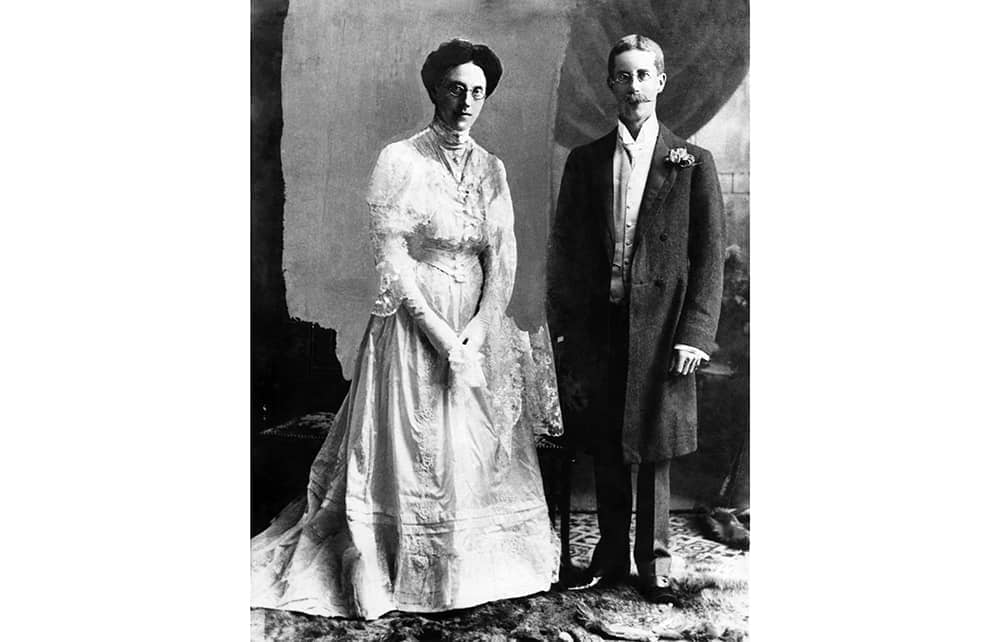The case of the retired major Herbert Rowse Armstrong, a Hay-on-Wye solicitor hanged in 1922 for killing his wife Katharine with arsenic, is one of nine examined in George Orwell’s 1946 Tribune essay ‘The Decline of the English Murder’ as having enthralled the public. ‘A little man of the professional class’, living an ‘intensely respectable life’, nevertheless, for reasons that appear somehow underpowered (in Armstrong’s case a change to his wife’s will and a romantic friendship, probably never consummated, with a woman he met in Bournemouth during the war), finds himself resorting to the bathroom cabinet or garden shed (‘the means chosen should, of course, be poison’) with heinous intent, and is only brought to justice after slipping up over some ‘tiny, unforeseeable detail’.
Armstrong did seem to have a lot of arsenic lying around for someone with a bit of a dandelion problem
From the account of Armstrong’s trial, which takes up around half of Stephen Bates’s book, it becomes abundantly clear that both the court case itself and the investigation which preceded it were conducted shockingly badly. The judge, Mr Justice Darling, was openly on the side of the prosecution. His career was drawing to a close, and it is suggested that he wanted to try the black cap on for size once more before hanging up his robes. Another Welsh solicitor had been acquitted of poisoning his wife a year or so before, and to let a second one go might have looked like carelessness. Eminent scientists handed down speculative and actively misleading pathological and toxicological testimony as if they were Moses returned from Sinai, and attempts to cross-examine them were stifled by the judge. Any hopes of appeal were stymied by the lawyers’ ingrained reluctance to admit to a mistake, whether collectively or personally. Astonishingly, the attorney general, who had served as prosecuting counsel, also had the power to refuse an appeal to the House of Lords, which he duly did.
It is also worth pointing out that there was no direct evidence against Armstrong: a capital case was decided entirely on circumstantial evidence. His wife had been physically and mentally ill for some time, and was self-medicating with quack remedies; she had spoken, at least obliquely, about suicide. However, Armstrong did seem to have a lot of arsenic lying around the place for someone who merely had a bit of a dandelion problem. A fellow solicitor and a local tax official were both taken violently ill after enjoying his hospitality in the months after his wife’s death. His marriage may have been unhappy -– but then again, it may not. He may have had a girlfriend, or business worries, or syphilis – or not. His children spoke of him fondly; his sister-in-law critically. The only fair conclusion is to say that the jury is still out, or ought to be – cold comfort for Armstrong, to say nothing of his orphaned children, who were given new names in separate homes. All the same, he probably wasn’t a man you would want to accept a buttered scone from.
The Poisonous Solicitor isn’t offered up as a fresh look at a cold case so much as a competent and assured essay in a hybrid genre one might call ‘true cosy crime’. The evidence mounts up: the twee cover graphics, the brisk character sketches of larger-than-life jurists, an emphasis on small details which isn’t so much a forensic reconstruction of events as a sustained campaign to inject colour into a bleak and comfortless tale. All this is done efficiently, though somewhat conventionally. Bates is disparaging about the lurid prose of the newspaper reporters covering the case, but at least one of them -– Matthew Anderson of the Manchester Guardian – takes wing from the page rather more vigorously than Bates himself does.
The book’s thesis – roughly that Armstrong was probably guilty, but the Crown failed to prove its case, and snapped his neck anyway – seems about right, but it’s curiously anaemic in narrative terms: there’s too much cuteness for any attempt at saeva indignatio to really catch light. A short chapter at the end, showing how some of the details of the case inspired the legion of cosy crime writers who were just revving up in the 1920s, sits queasily alongside the revelation that John Ellis, the hangman involved, tried to take his own life in 1924, and then, haunted and impoverished (as a freelancer, he received no pension from the Home Office), finally succeeded in 1932. The myopic view of society and childish sense of right and wrong you see in Agatha Christie and Dorothy L. Sayers doesn’t quite fit when you’re talking about real people. Meanwhile, earlier this month it was announced that Richard Osman, the TV quizmaster and author of two cosy bestsellers, was quitting his broadcasting career to concentrate on writing. Who says crime doesn’t pay?






Comments